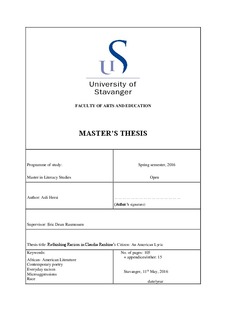| dc.contributor.author | Hersi, Asli | |
| dc.coverage.spatial | USA | nb_NO |
| dc.date.accessioned | 2016-08-22T08:49:42Z | |
| dc.date.available | 2016-08-22T08:49:42Z | |
| dc.date.issued | 2016-05-11 | |
| dc.identifier.uri | http://hdl.handle.net/11250/2400199 | |
| dc.description | Master's thesis in Literacy studies | nb_NO |
| dc.description.abstract | The issue of race in America in the twenty-first century is still a turbulent matter. The end of segregation in schools, politics, marriages and workplaces created a mask that hid racial inequalities and injustices (Whitmarsh 1). In a time where police brutalities have frequently surfaced in the media in a supposed “post-racial America”, Claudia Rankine writes a thought-provoking 160 page long “book-length poem” about everyday racism arguing that the overlooking of microaggressions (brief daily commonplace verbal and behavioral racial slights) are allowing macroaggressions (blatant racial act such as hate crime) to occur. Rankine’s “book-length poem” is an experimental work melding poetry, prose, essays, commentaries, video transcripts and imagery, which challenges the notion of what poetry can do and what poetry is supposed to look like. This thesis is a study on Claudia Rankine’s Citizen: An American Lyric in regards to her approach to the African American racial experience in a supposed “post-racial America”.
Citizen is filled with anecdotal microaggressions from both Rankine herself and her friends, but also moments when microaggressions escalate to incident that have been frequent in the media such as the Trayvon Martin shooting and Zinedine Zidane’s World Cup head-butt.
Naming her book Citizen: An American Lyric (2014), Rankine challenges the notion of citizenship and African American’s position as second class citizens. African Americans are still experiencing hardships that stems from slavery such as racial profiling, stereotyping, and racial slurs. Their citizenship which took centuries to gain, does not protect them from these hardships.
Rankine is concerned with the subtle “everyday racism” African Americans experience on a daily basis and the profound affects this has on their self-image, but also the threat this poses to their lives. Rankine intervenes in current debates about racism due to her approach on everyday racism. In a time where macroaggressions such as police brutalities have reached the news and is taking up a lot of the racial discussion in the United States, Rankine decides to take out a magnifier to look at where the disease starts. Citizen is able to urgently speak about microaggressions as if they were macroaggressions. The urgency is created when Rankine follows up her anecdotes with meditations that show how racial comments and gestures are affecting people’s mental state.
My interpretation is that Rankine is putting forth a message that claims that microaggressions should be considered an act of racism to the same degree macroaggresions are. | nb_NO |
| dc.language.iso | eng | nb_NO |
| dc.publisher | University of Stavanger, Norway | nb_NO |
| dc.relation.ispartofseries | Masteroppgave/UIS-HF-IKS/2016; | |
| dc.rights | Navngivelse 3.0 Norge | * |
| dc.rights.uri | http://creativecommons.org/licenses/by/3.0/no/ | * |
| dc.subject | African-American Literature | nb_NO |
| dc.subject | race | nb_NO |
| dc.subject | litteratur | nb_NO |
| dc.subject | lyrikk | nb_NO |
| dc.subject | contemporary poetry | nb_NO |
| dc.subject | everyday racism | nb_NO |
| dc.subject | rasisme | nb_NO |
| dc.title | Rethinking Racism in Claudia Rankine's Citizen: An American Lyric | nb_NO |
| dc.type | Master thesis | nb_NO |
| dc.subject.nsi | VDP::Humanities: 000::Literary disciplines: 040::General literary science: 041 | nb_NO |

